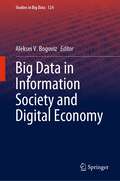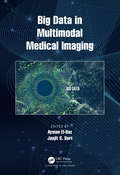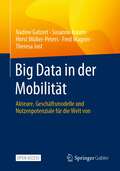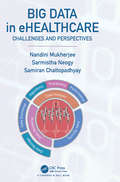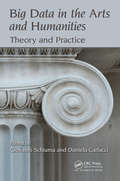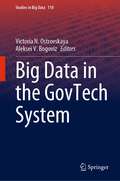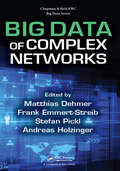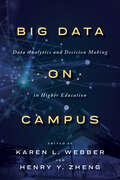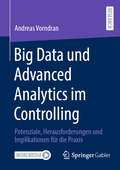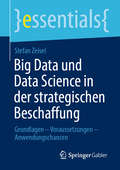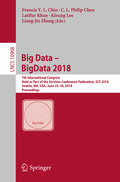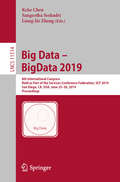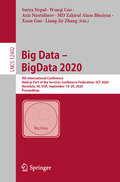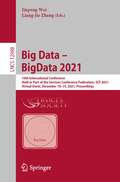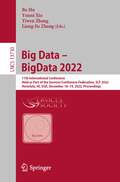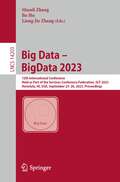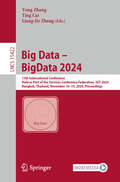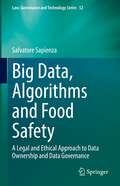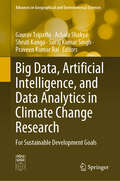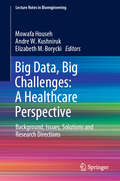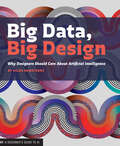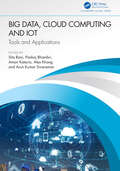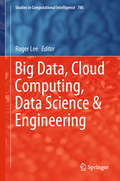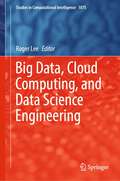- Table View
- List View
Big Data in Information Society and Digital Economy (Studies in Big Data #124)
by Aleksei V. BogovizThis book redefines the essence of the information society and the digital economy, offering a new approach to their management and organization based on big data. The novelty of the new approach is that it ensures the use of the advanced technological capabilities of the Fourth Industrial Revolution to accelerate socio-economic development. The success of the new approach is based on progressive social institutions and advanced big data technology. Theoretical issues, methodological developments, and the author’s applied recommendations are consistently presented in forty chapters distributed in five sections. The book contains cases that reveal the practical experience of the Eurasian Economic Union (EAEU). The intended readership of the book is scientists. The book is interesting and useful for them because it presents an innovative model of information society and digital economy development driven by big data.
Big Data in Multimodal Medical Imaging
by Jasjit S. Suri Ayman El-BazThere is an urgent need to develop and integrate new statistical, mathematical, visualization, and computational models with the ability to analyze Big Data in order to retrieve useful information to aid clinicians in accurately diagnosing and treating patients. The main focus of this book is to review and summarize state-of-the-art big data and deep learning approaches to analyze and integrate multiple data types for the creation of a decision matrix to aid clinicians in the early diagnosis and identification of high risk patients for human diseases and disorders. Leading researchers will contribute original research book chapters analyzing efforts to solve these important problems.
Big Data in der Mobilität: Akteure, Geschäftsmodelle und Nutzenpotenziale für die Welt von morgen
by Horst Müller-Peters Susanne Knorre Fred Wagner Nadine Gatzert Theresa JostDieses Open-Access-Buch befasst sich mit den gesellschaftlich und wirtschaftlich weitreichenden Potenzialen von „Big Data in der Mobilität“. Zunächst werden der Mobilitätsmarkt mit seinen Akteuren sowie deren Interessen und oft paradoxen Verhaltensweisen vorgestellt sowie eine „Mobilitäts-Datenkarte“ abgeleitet. Darauf aufbauend werden auf Basis mehrerer empirischer Studien die Chancen und Risiken der Datenerhebung und deren Nutzung für neue Geschäftsmodelle und das Gemeinwohl, nicht zuletzt den Klimaschutz, analysiert. Daraus werden Nutzenpotenziale „für die Welt von morgen“ abgeleitet und die notwendigen politischen und gesellschaftlichen Voraussetzungen skizziert. Ein Ausblick auf die Zukunft der Mobilität und Implikationen für betroffene Branchen – am Beispiel der Versicherungswirtschaft – runden das Buch ab.
Big Data in ehealthcare: Challenges and Perspectives
by Nandini Mukherjee Samiran Chattopadhyay Sarmistha NeogyThis book focuses on the different aspects of handling big data in healthcare. It showcases the current state-of-the-art technology used for storing health records and health data models. It also focuses on the research challenges in big data acquisition, storage, management and analysis.
Big Data in the Arts and Humanities: Theory and Practice (Data Analytics Applications)
by Giovanni Schiuma Daniela CarlucciAs digital technologies occupy a more central role in working and everyday human life, individual and social realities are increasingly constructed and communicated through digital objects, which are progressively replacing and representing physical objects. They are even shaping new forms of virtual reality. This growing digital transformation coupled with technological evolution and the development of computer computation is shaping a cyber society whose working mechanisms are grounded upon the production, deployment, and exploitation of big data. In the arts and humanities, however, the notion of big data is still in its embryonic stage, and only in the last few years, have arts and cultural organizations and institutions, artists, and humanists started to investigate, explore, and experiment with the deployment and exploitation of big data as well as understand the possible forms of collaborations based on it. Big Data in the Arts and Humanities: Theory and Practice explores the meaning, properties, and applications of big data. This book examines therelevance of big data to the arts and humanities, digital humanities, and management of big data with and for the arts and humanities. It explores the reasons and opportunities for the arts and humanities to embrace the big data revolution. The book also delineates managerial implications to successfully shape a mutually beneficial partnership between the arts and humanities and the big data- and computational digital-based sciences. Big data and arts and humanities can be likened to the rational and emotional aspects of the human mind. This book attempts to integrate these two aspects of human thought to advance decision-making and to enhance the expression of the best of human life.
Big Data in the GovTech System (Studies in Big Data #110)
by Victoria N. Ostrovskaya Aleksei V. BogovizThis book presents applications and solutions of Big Data in the GovTech system and recommendations for regulating the institutions of the digital economy and information society for the wide application of Big Data with the use of the institutional approach. In this book, a systematic scientific understanding of GovTech is formed, the central place of Big Data in this system is substantiated, and modern experience in the functioning and development of this system is considered in detail. The contribution of the book to the literature is to bridge the gap between theory and practice of GovTech through a comprehensive study of all its manifestations in the three parts of the book. The first part is devoted to GovTech in the provision of high-tech educational services based on Big Data. The second part reflects state regulation of the economy by industry using Big Data in the GovTech. The third part outlined the digital divide and the experience of overcoming it with the help of GovTech based on Big Data.The practical significance of the book lies in the fact that it offers a holistic practical guide to the development of the GovTech system based on Big Data. The book will be of interest to academic scientists studying GovTech, as it clarified its categorical apparatus and scientific basis. The subjects of management in GovTech form the secondary target audience of this book, which provides them with numerous cases from the experience of modern Russia, as well as applied recommendations for improving the efficiency of the GovTech system based on Big Data. The book is multidisciplinary and is intended for scientists from various fields of science (pedagogy, economics, business, law, management, and ICT).
Big Data of Complex Networks (Chapman & Hall/CRC Big Data Series)
by Matthias Dehmer, Frank Emmert-Streib, Stefan Pickl and Andreas HolzingerBig Data of Complex Networks presents and explains the methods from the study of big data that can be used in analysing massive structural data sets, including both very large networks and sets of graphs. As well as applying statistical analysis techniques like sampling and bootstrapping in an interdisciplinary manner to produce novel techniques for analyzing massive amounts of data, this book also explores the possibilities offered by the special aspects such as computer memory in investigating large sets of complex networks. Intended for computer scientists, statisticians and mathematicians interested in the big data and networks, Big Data of Complex Networks is also a valuable tool for researchers in the fields of visualization, data analysis, computer vision and bioinformatics. Key features: Provides a complete discussion of both the hardware and software used to organize big data Describes a wide range of useful applications for managing big data and resultant data sets Maintains a firm focus on massive data and large networks Unveils innovative techniques to help readers handle big data Matthias Dehmer received his PhD in computer science from the Darmstadt University of Technology, Germany. Currently, he is Professor at UMIT – The Health and Life Sciences University, Austria, and the Universität der Bundeswehr München. His research interests are in graph theory, data science, complex networks, complexity, statistics and information theory. Frank Emmert-Streib received his PhD in theoretical physics from the University of Bremen, and is currently Associate professor at Tampere University of Technology, Finland. His research interests are in the field of computational biology, machine learning and network medicine. Stefan Pickl holds a PhD in mathematics from the Darmstadt University of Technology, and is currently a Professor at Bundeswehr Universität München. His research interests are in operations research, systems biology, graph theory and discrete optimization. Andreas Holzinger received his PhD in cognitive science from Graz University and his habilitation (second PhD) in computer science from Graz University of Technology. He is head of the Holzinger Group HCI-KDD at the Medical University Graz and Visiting Professor for Machine Learning in Health Informatics Vienna University of Technology.
Big Data on Campus: Data Analytics and Decision Making in Higher Education
by Karen L. Webber and Henry Y. ZhengHow data-informed decision making can make colleges and universities more effective institutions.The continuing importance of data analytics is not lost on higher education leaders, who face a multitude of challenges, including increasing operating costs, dwindling state support, limits to tuition increases, and increased competition from the for-profit sector. To navigate these challenges, savvy leaders must leverage data to make sound decisions. In Big Data on Campus, leading data analytics experts and higher ed leaders show the role that analytics can play in the better administration of colleges and universities. Aimed at senior administrative leaders, practitioners of institutional research, technology professionals, and graduate students in higher education, the book opens with a conceptual discussion of the roles that data analytics can play in higher education administration. Subsequent chapters address recent developments in technology, the rapid accumulation of data assets, organizational maturity in building analytical capabilities, and methodological advancements in developing predictive and prescriptive analytics. Each chapter includes a literature review of the research and application of analytics developments in their respective functional areas, a discussion of industry trends, examples of the application of data analytics in their decision process, and other related issues that readers may wish to consider in their own organizational environment to find opportunities for building robust data analytics capabilities.Using a series of focused discussions and case studies, Big Data on Campus helps readers understand how analytics can support major organizational functions in higher education, including admission decisions, retention and enrollment management, student life and engagement, academic and career advising, student learning and assessment, and academic program planning. The final section of the book addresses major issues and human factors involved in using analytics to support decision making; the ethical, cultural, and managerial implications of its use; the role of university leaders in promoting analytics in decision making; and the need for a strong campus community to embrace the analytics revolution. Contributors: Rana Glasgal, J. Michael Gower, Tom Gutman, Brian P. Hinote, Braden J. Hosch, Aditya Johri, Christine M. Keller, Carrie Klein, Jaime Lester, Carrie Hancock Marcinkevage, Gail B. Marsh, Susan M. Menditto, Jillian N. Morn, Valentina Nestor, Cathy O'Bryan, Huzefa Rangwala, Timothy Renick, Charles Tegen, Rachit Thariani, Chris Tompkins, Lindsay K. Wayt, Karen L. Webber, Henry Y. Zheng, Ying Zhou
Big Data over Networks
by Shuguang Cui Alfred O. Hero Iii Zhi-Quan Luo José M. F. MouraUtilising both key mathematical tools and state-of-the-art research results, this text explores the principles underpinning large-scale information processing over networks and examines the crucial interaction between big data and its associated communication, social and biological networks. Written by experts in the diverse fields of machine learning, optimisation, statistics, signal processing, networking, communications, sociology and biology, this book employs two complementary approaches: first analysing how the underlying network constrains the upper-layer of collaborative big data processing, and second, examining how big data processing may boost performance in various networks. Unifying the broad scope of the book is the rigorous mathematical treatment of the subjects, which is enriched by in-depth discussion of future directions and numerous open-ended problems that conclude each chapter. Readers will be able to master the fundamental principles for dealing with big data over large systems, making it essential reading for graduate students, scientific researchers and industry practitioners alike.
Big Data und Advanced Analytics im Controlling: Potenziale, Herausforderungen und Implikationen für die Praxis
by Andreas VorndranDie Digitalisierung und Entwicklungen im Gebiet der künstlichen Intelligenz haben in den letzten Jahren erhebliche Veränderungen in der Gesellschaft und der Unternehmenspraxis hervorgerufen. Aufkommende Technologien in den Feldern Big Data und Advanced Analytics werden auch im Controlling zunehmend diskutiert oder bereits eingesetzt. Dabei befinden sich der Wissensstand, inwieweit Big Data und Advanced Analytics das Controlling beeinflussen und verändern können, und die praktische Anwendung noch in einem frühen Stadium. Diese Arbeit befasst sich deshalb mit der Untersuchung der möglichen Auswirkungen von Big Data und Advanced Analytics im Controlling. Vor diesem Hintergrund werden die Einflüsse dieser digitalen Trends auf den Informationsversorgungsprozess des Controllings, auf die Erfüllung Controlling-spezifischer Anforderungen an Informationen und auf das Forecasting, die Budgetierung und die strategische Planung analysiert. Ferner werden praxisrelevante Herausforderungen, Grenzen und Risiken bei der Implementierung und Nutzung identifiziert sowie Implikationen zu deren Umgang zur Ausschöpfung der Potenziale abgeleitet.
Big Data und Data Science in der strategischen Beschaffung: Grundlagen – Voraussetzungen – Anwendungschancen (essentials)
by Stefan ZeiselBig Data und Data Science sind Trends, die sowohl in der Wissenschaft als auch in Unternehmen auf großes Interesse stoßen. Dieses essential zeigt einen konzeptionellen Rahmen auf, um die Grundlagen von Big Data und Data Science besser zu verstehen. Einkaufsentscheider und Einkaufsorganisationen können dann aufbauend auf der Beschaffungsdigitalisierung sowie weiteren Datenquellen ein Big Data Warehouse konzipieren, welches die Voraussetzung schafft, um wichtige Beschaffungsprobleme zu lösen. Analytische Methoden werden genauso beleuchtet, wie neue Fähigkeiten in bereichsübergreifenden Teams. Abschließend werden 30 konkrete Anwendungsfälle von Big Data für die strategische Beschaffung vorgestellt.
Big Data – BigData 2018: 7th International Congress, Held as Part of the Services Conference Federation, SCF 2018, Seattle, WA, USA, June 25–30, 2018, Proceedings (Lecture Notes in Computer Science #10968)
by Latifur Khan Liang-Jie Zhang Kisung Lee Francis Y. L. Chin C. L. Philip ChenThis volume constitutes the proceedings of the 7th International Conference on BIGDATA 2018, held as Part of SCF 2018 in Seattle, WA, USA in June 2018.The 22 full papers together with 10 short papers published in this volume were carefully reviewed and selected from 97 submissions. They are organized in topical sections such as Data analysis, data as a service, services computing, data conversion, data storage, data centers, dataflow architectures, data compression, data exchange, data modeling, databases, and data management.
Big Data – BigData 2019: 8th International Congress, Held as Part of the Services Conference Federation, SCF 2019, San Diego, CA, USA, June 25–30, 2019, Proceedings (Lecture Notes in Computer Science #11514)
by Liang-Jie Zhang Keke Chen Sangeetha SeshadriThis volume constitutes the proceedings of the 8th International Congress on BIGDATA 2019, held as Part of SCF 2019 in San Diego, CA, USA in June 2019. The 9 full papers presented in this volume were carefully reviewed and selected from 14 submissions. They cover topics such as: Big Data Models and Algorithms; Big Data Architectures; Big Data Management; Big Data Protection, Integrity and Privacy; Security Applications of Big Data; Big Data Search and Mining; Big Data for Enterprise, Government and Society.
Big Data – BigData 2020: 9th International Conference, Held as Part of the Services Conference Federation, SCF 2020, Honolulu, HI, USA, September 18-20, 2020, Proceedings (Lecture Notes in Computer Science #12402)
by Xuan Guo Surya Nepal Liang-Jie Zhang Wenqi Cao Aziz Nasridinov MD Zakirul Alam BhuiyanThis book constitutes the proceedings of the 9th International Conference on Big Data, BigData 2020, held as part of SCF 2020, during September 18-20, 2020. The conference was planned to take place in Honolulu, HI, USA and was changed to a virtual format due to the COVID-19 pandemic. The 16 full and 3 short papers presented were carefully reviewed and selected from 52 submissions. The topics covered are Big Data Architecture, Big Data Modeling, Big Data As A Service, Big Data for Vertical Industries (Government, Healthcare, etc.), Big Data Analytics, Big Data Toolkits, Big Data Open Platforms, Economic Analysis, Big Data for Enterprise Transformation, Big Data in Business Performance Management, Big Data for Business Model Innovations and Analytics, Big Data in Enterprise Management Models and Practices, Big Data in Government Management Models and Practices, and Big Data in Smart Planet Solutions.
Big Data – BigData 2021: 10th International Conference, Held as Part of the Services Conference Federation, SCF 2021, Virtual Event, December 10–14, 2021, Proceedings (Lecture Notes in Computer Science #12988)
by Liang-Jie Zhang Jinpeng WeiThis book constitutes the proceedings of the 10th International Conference on Big Data, BigData 2021, held online as part of SCF 2021, during December 10-14, 2021.The 6 full and 2 short papers presented were carefully reviewed and selected from 53 submissions. The topics covered are Big Data Architecture, Big Data Modeling, Big Data As A Service, Big Data for Vertical Industries (Government, Healthcare, etc.), Big Data Analytics, Big Data Toolkits, Big Data Open Platforms, Economic Analysis, Big Data for Enterprise Transformation, Big Data in Business Performance Management, Big Data for Business Model Innovations and Analytics, Big Data in Enterprise Management Models and Practices, Big Data in Government Management Models and Practices, and Big Data in Smart Planet Solutions.
Big Data – BigData 2022: 11th International Conference, Held as Part of the Services Conference Federation, SCF 2022, Honolulu, HI, USA, December 10–14, 2022, Proceedings (Lecture Notes in Computer Science #13730)
by Bo Hu Liang-Jie Zhang Yunni Xia Yiwen ZhangThis book constitutes the proceedings of the 11th International Conference on Big Data, BigData 2022, held as part of the Services Conference Federation, SCF 2022, held in Honolulu, HI, USA, in December 2022. The 4 full papers and 5 short papers presented in this volume were carefully reviewed and selected from 16 submissions.The 2022 International Congress on Big Data (BigData 2022) aims to provide an international forum that formally explores various business insights of all kinds of value-added "services". Big Data is a key enabler of exploring business insights and economics of services.
Big Data – BigData 2023: 12th International Conference, Held as Part of the Services Conference Federation, SCF 2023, Honolulu, HI, USA, September 23–26, 2023, Proceedings (Lecture Notes in Computer Science #14203)
by Bo Hu Liang-Jie Zhang Shunli ZhangThis book constitutes the refereed proceedings of the 12th International Conference, BigData 2023, Held as Part of the Services Conference Federation, SCF 2023, Honolulu, HI, USA, during September 23–26, 2023. The 14 full papers presented together with 2 short papers were carefully reviewed and selected from 27 submissions. The conference focuses on research track and application track.
Big Data – BigData 2024: 13th International Conference, Held as Part of the Services Conference Federation, SCF 2024, Bangkok, Thailand, November 16-19, 2024, Proceedings (Lecture Notes in Computer Science #15422)
by Yong Zhang Liang-Jie Zhang Ting CaiThis book constitutes the refereed proceedings of the 13th International Conference on Big Data, BigData 2024, held as part of the Services Conference Federation, SCF 2024, in Bangkok, Thailand, during November 16-19, 2024. The 8 full papers and 1 short paper included in this book were carefully reviewed and selected from 21 submissions. They focus on various topics within the field of Data-based services such as Big Data Architecture, Big Data Modeling, Big Data As A Service, Big Data for Vertical Industries (Government, Healthcare, etc.), Big Data Analytics, Big Data Toolkits, Big Data Open Platforms, Economic Analysis, Big Data for Enterprise Transformation, Big Data in Business Performance Management, Big Data for Business Model Innovations and Analytics, Big Data in Enterprise Management Models and Practices, Big Data in Government Management Models and Practices, and Big Data in Smart Planet Solutions. The papers have been organized under the following topical sections: Research track; Application track; and Short paper track.
Big Data, Algorithms and Food Safety: A Legal and Ethical Approach to Data Ownership and Data Governance (Law, Governance and Technology Series #52)
by Salvatore SapienzaThis book identifies the principles that should be applied when processing Big Data in the context of food safety risk assessments. Food safety is a critical goal in the protection of individuals’ right to health and the flourishing of the food and feed market. Big Data is fostering new applications capable of enhancing the accuracy of food safety risk assessments. An extraordinary amount of information is analysed to detect the existence or predict the likelihood of future risks, also by means of machine learning algorithms. Big Data and novel analysis techniques are topics of growing interest for food safety agencies, including the European Food Safety Authority (EFSA). This wealth of information brings with it both opportunities and risks concerning the extraction of meaningful inferences from data. However, conflicting interests and tensions among the parties involved are hindering efforts to find shared methods for steering the processing of Big Data in a sound, transparent and trustworthy way. While consumers call for more transparency, food business operators tend to be reluctant to share informational assets. This has resulted in a considerable lack of trust in the EU food safety system. A recent legislative reform, supported by new legal cases, aims to restore confidence in the risk analysis system by reshaping the meaning of data ownership in this domain. While this regulatory approach is being established, breakthrough analytics techniques are encouraging thinking about the next steps in managing food safety data in the age of machine learning.The book focuses on two core topics – data ownership and data governance – by evaluating how the regulatory framework addresses the challenges raised by Big Data and its analysis in an applied, significant, and overlooked domain. To do so, it adopts an interdisciplinary approach that considers both the technological advances and the policy tools adopted in the European Union, while also assuming an ethical perspective when exploring potential solutions. The conclusion puts forward a proposal: an ethical blueprint for identifying the principles – Security, Accountability, Fairness, Explainability, Transparency and Privacy – to be observed when processing Big Data for food safety purposes, including by means of machine learning. Possible implementations are then discussed, also in connection with two recent legislative proposals, namely the Data Governance Act and the Artificial Intelligence Act.
Big Data, Artificial Intelligence, and Data Analytics in Climate Change Research: For Sustainable Development Goals (Advances in Geographical and Environmental Sciences)
by Praveen Kumar Rai Shruti Kanga Suraj Kumar Singh Gaurav Tripathi Achala ShakyaThis book explores the potential of big data, artificial intelligence (AI), and data analytics to address climate change and achieve the Sustainable Development Goals (SDGs). Furthermore, the book covers a wide range of related topics, including climate change data sources, big data analytics techniques, remote sensing, renewable energy, open data, public–private partnerships, ethical and legal issues, and case studies of successful applications. The book also discusses the challenges and opportunities presented by these technologies and provides insights into future research directions.In order to address climate change and achieve the SDGs, it is crucial to understand the complex interplay between climate and environmental factors. The use of big data, AI, and data analytics can play a vital role in this effort by providing the means to collect, process, and analyze vast amounts of environmental data. This book is an essential resource for researchers, policymakers, and practitioners interested in leveraging these technologies to tackle the pressing challenge of climate change and achieve the SDGs.
Big Data, Big Challenges: Background, Issues, Solutions and Research Directions (Lecture Notes in Bioengineering)
by Mowafa Househ Andre W. Kushniruk Elizabeth M. BoryckiThis is the first book to offer a comprehensive yet concise overview of the challenges and opportunities presented by the use of big data in healthcare. The respective chapters address a range of aspects: from health management to patient safety; from the human factor perspective to ethical and economic considerations, and many more. By providing a historical background on the use of big data, and critically analyzing current approaches together with issues and challenges related to their applications, the book not only sheds light on the problems entailed by big data, but also paves the way for possible solutions and future research directions. Accordingly, it offers an insightful reference guide for health information technology professionals, healthcare managers, healthcare practitioners, and patients alike, aiding them in their decision-making processes; and for students and researchers whose work involves data science-related research issues in healthcare.
Big Data, Big Design: Why Designers Should Care about Artificial Intelligence
by Helen ArmstrongBig Data, Big Design provides designers with the tools they need to harness the potential of machine learning and put it to use for good through thoughtful, human-centered, intentional design.Enter the world of Machine Learning (ML) and Artificial Intelligence (AI) through a design lens in this thoughtful handbook of practical skills, technical knowledge, interviews, essays, and theory, written specifically for designers. Gain an understanding of the design opportunities and design biases that arise when using predictive algorithms. Learn how to place design principles and cultural context at the heart of AI and ML through real-life case studies and examples. This portable, accessible guide will give beginners and more advanced AI and ML users the confidence to make reasoned, thoughtful decisions when implementing ML design solutions.
Big Data, Cloud Computing and IoT: Tools and Applications
by Alex Khang Pankaj Bhambri Sita Rani Arun Kumar Sivaraman Aman KatariaCloud computing, the Internet of Things (IoT), and big data are three significant technological trends affecting the world's largest corporations. This book discusses big data, cloud computing, and the IoT, with a focus on the benefits and implementation problems. In addition, it examines the many structures and applications pertinent to these disciplines. Also, big data, cloud computing, and the IoT are proposed as possible study avenues. Features: Informs about cloud computing, IoT and big data, including theoretical foundations and the most recent empirical findings Provides essential research on the relationship between various technologies and the aggregate influence they have on solving real-world problems Ideal for academicians, developers, researchers, computer scientists, practitioners, information technology professionals, students, scholars, and engineers exploring research on the incorporation of technological innovations to address contemporary societal challenges
Big Data, Cloud Computing, Data Science & Engineering (Studies in Computational Intelligence #786)
by Roger LeeThis book presents the outcomes of the 3rd IEEE/ACIS International Conference on Big Data, Cloud Computing, Data Science & Engineering (BCD 2018), which was held on July 10–12, 2018 in Kanazawa. The aim of the conference was to bring together researchers and scientists, businesspeople and entrepreneurs, teachers, engineers, computer users, and students to discuss the various fields of computer science, to share their experiences, and to exchange new ideas and information in a meaningful way. All aspects (theory, applications and tools) of computer and information science, the practical challenges encountered along the way, and the solutions adopted to solve them are all explored here. The conference organizers selected the best papers from among those accepted for presentation. The papers were chosen on the basis of review scores submitted by members of the program committee and subsequently underwent further rigorous review. Following this second round of review, 13 of the conference’s most promising papers were selected for this Springer (SCI) book. We eagerly await the important contributions that we know these authors will make to the field of computer and information science.
Big Data, Cloud Computing, and Data Science Engineering (Studies in Computational Intelligence #1075)
by Roger LeeThis book presents scientific results of the 7th IEEE/ACIS International Conference on Big Data, Cloud Computing, Data Science & Engineering (BCD 2021) which was held on August 4-6, 2022 in Danang, Vietnam. The aim of this conference was to bring together researchers and scientists, businessmen and entrepreneurs, teachers, engineers, computer users, and students to discuss the numerous fields of computer science and to share their experiences and exchange new ideas and information in a meaningful way. All aspects (theory, applications, and tools) of computer and information science, the practical challenges encountered along the way, and the solutions adopted to solve them are all explored here in the results of the articles featured in this book. The conference organizers selected the best papers from those papers accepted for presentation at the conference. The papers were chosen based on review scores submitted by members of the program committee and underwent further rigorous rounds of review. From this second round of review, 15 of the conference’s most promising papers are then published in this Springer (SCI) book and not the conference proceedings. We impatiently await the important contributions that we know these authors will bring to the field of computer and information science.
